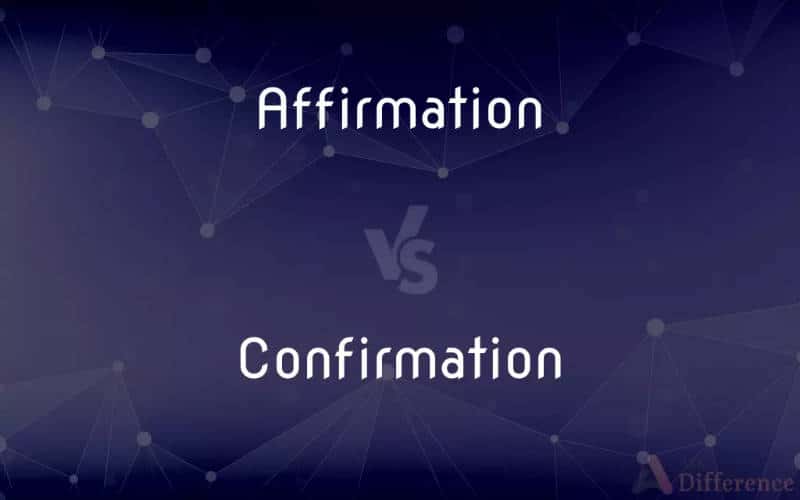The Difference Between Affirmation and Confirmation! When it comes to communication, the words we use can have a significant impact on how our message is received.

Two terms that are often used interchangeably but have distinct meanings are affirmation and confirmation. Understanding the difference between affirmation versus confirmation, these two concepts can help us communicate more effectively and build stronger relationships.
Affirmations and Afformations® are powerful tools that can help individuals shift their mindset and achieve their goals. By using positive language, individuals can rewire their brains to think in a more positive and optimistic manner. Affirmations are simple, yet powerful statements that reflect the desired state of being or outcome. In contrast, Afformations are questions that focus on the positive and invite the mind to explore possibilities. By using both affirmations and Afformations consistently, individuals can boost their confidence, increase their self-belief, and cultivate emotional wellbeing. These techniques can also help individuals manifest their goals and desires into reality. Regular practice is crucial in establishing a new positive thought pattern and incorporating these techniques into daily life. One could use an affirmation such as "I am capable of achieving my goals and dreams," or an Afformation like "Why do I continuously attract opportunities that lead to my success?"

Affirmation is the act of providing emotional support and encouragement to someone. It involves acknowledging their strengths, abilities, and positive qualities. Affirmation can be verbal or nonverbal and can take many forms, such as compliments, praise, or simply listening and showing empathy. The goal of affirmation is to boost someone's self-esteem and confidence, and to help them feel valued and appreciated.
Affirmation is often used in therapy and counseling to help individuals overcome negative self-talk and build a more positive self-image. It can also be used in personal relationships to strengthen bonds and show appreciation for loved ones. Affirmation versus confirmation possesses a huge difference, confirmation involves simply agreeing with someone or validating their beliefs or opinions. While confirmation can be helpful in some situations, affirmation goes beyond agreement and focuses on building up the person's sense of self-worth and confidence. By providing affirmation, we can help others feel more empowered and capable of achieving their goals.
Confirmation, on the other hand, is the act of verifying or validating something that is already known or believed to be true. It involves providing evidence or proof to support a claim or belief. Confirmation can be done through research, experimentation, or observation. The goal of confirmation is to establish the truth or accuracy of something, and to provide a basis for further action or decision-making.
Understanding the difference of affirmation versus confirmation is crucial for effective communication. Affirmation is about providing emotional support and encouragement, while confirmation is about verifying or validating something that is already known or believed to be true. By understanding the distinction between these two terms, you can communicate more effectively and avoid confusion or misunderstandings. Additionally, being able to provide both affirmation and confirmation can help build trust and strengthen relationships.
Affirmation is an important aspect of communication, particularly in personal relationships and professional settings. It involves providing emotional support and encouragement to someone, often through positive feedback or compliments. For example, telling a friend that they are doing a great job on a project or complimenting a coworker on their presentation skills are forms of affirmation.
Affirmation can be seen in statements like "I believe in you" or "You are doing a great job." It is about providing emotional support and encouragement to someone. Confirmation, on the other hand, can be seen in statements like "Yes, that is correct" or "I can verify that information." It is about verifying or validating something that is already known or believed to be true. In effective communication, it is important to provide both affirmation and confirmation to build trust and strengthen relationships.
An example of affirmation in communication could be telling a coworker, "I really appreciate your hard work on this project. Your hard work and dedication are truly remarkable, and they are making a positive impact on the team. This statement acknowledges the coworker's effort and contribution, and it can inspire them to continue striving towards success. On the other hand, an example of confirmation in communication could be responding to a question with, "Yes, that is correct. The meeting is scheduled for next Tuesday at 2 pm." This statement verifies information that is already known or believed to be true, which can help to avoid misunderstandings or confusion. By providing both affirmation and confirmation in communication, we can create a positive and productive environment where trust and respect are fostered.
Incorporating affirmation and confirmation into your daily life can greatly improve your communication skills and relationships. Start by actively listening to others and acknowledging their feelings and experiences with affirming statements. When it comes to confirmation, be sure to verify information before sharing it and use clear and concise language to avoid misunderstandings. By balancing both affirmation and confirmation, you can create a positive and trustworthy environment in all areas of your life.
Affirmation and confirmation are two important communication tools that can help you build stronger relationships and improve your overall communication skills. Affirmation involves actively listening to others and acknowledging their feelings and experiences with positive statements. For example, if a friend is sharing a difficult experience, you might say, “I hear you and I’m here for you.” This type of affirmation can help build trust and create a supportive environment.
In conclusion, the distinction between affirmation and confirmation lies in their fundamental nature and purpose within human communication. Affirmation serves as a means to provide emotional support, encouragement, and validation to individuals, reinforcing their self-esteem and confidence. On the other hand, confirmation primarily involves verifying facts, information, or beliefs to establish accuracy and certainty.
While both affirmation and confirmation play essential roles in our interactions with others, understanding when and how to employ each can greatly enhance effective communication and foster positive relationships. Striking a balance between offering affirmation to nurture self-worth and providing confirmation to ensure accuracy is key to fostering healthy and constructive dialogue in various aspects of life.
If you like Affirmation Versus Confirmation, you’re going to LOVE AFFORMATIONS VERSUS CONFIRMATION.
AFFORMATIONS are positive and empowering questions you ask yourself. The goal of using Afformations vs. affirmations is to change your beliefs by changing the quality of your questions.
In my Afformations® System online program, you’ll discover how to get the wealth, the body and the lifestyle you’ve always wanted by doing the exact OPPOSITE of what “they” told you in The Secret.
In fact, what you're about to discover goes against everything you've been told…yet more than 1 million people around the world, including Hollywood celebrities, 8-figure CEOs and professional athletes, SWEAR by it!
Learn more at https://Afformations.com

Dr. Noah St. John, The Father of AFFORMATIONS®
Creator of The 12-Week Breakthrough
